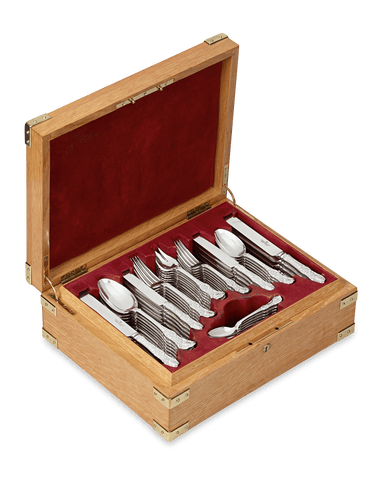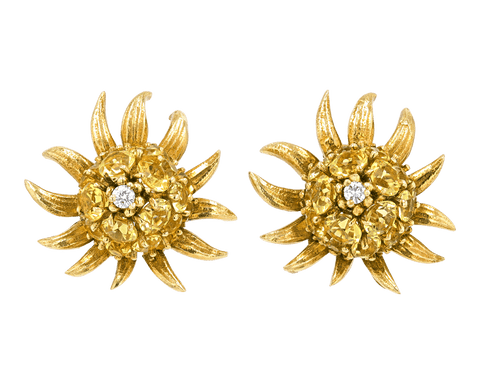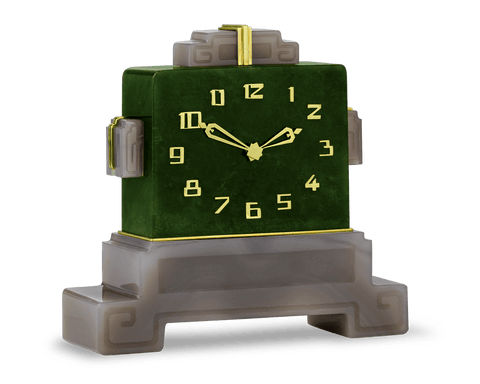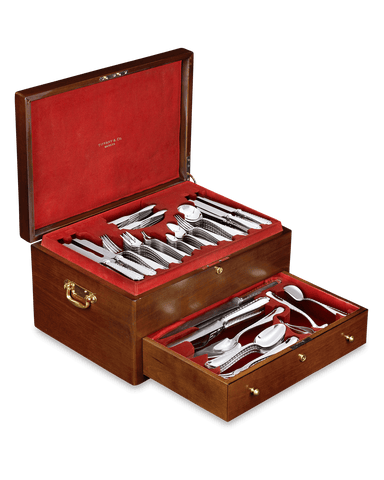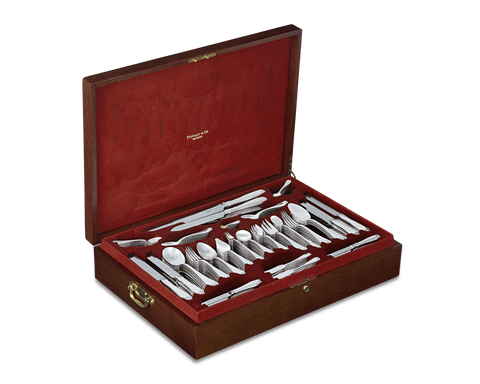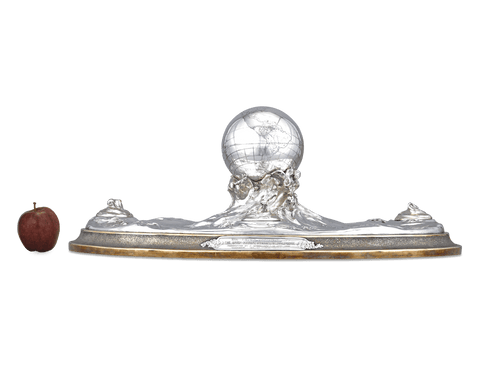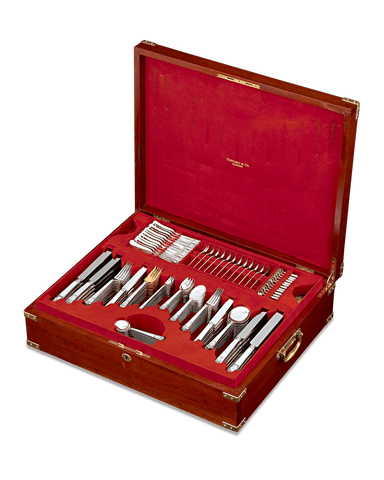Artists & Artisans
Tiffany & Co.
Tiffany & Co. has long stood as a paragon of American luxury and craftsmanship, transcending mere jewelry to become a cultural icon in its own right. From its inception, Tiffany has been synonymous with elegance, innovation and exquisite craftsmanship, encapsulating a legacy that stretches over two centuries.
Early Years |
Founded by Charles Lewis Tiffany and John B. Young in 1837 in New York City, Tiffany & Co. began its journey as a "stationery and fancy goods emporium," evolving into one of the most prestigious names in fine jewelry and silverware.
Charles Lewis Tiffany, born in 1812 in Killingly, Connecticut, was a visionary entrepreneur who shaped the identity of Tiffany & Co., ensuring its growth from a modest enterprise into a global symbol of luxury and refinement. The early years of Tiffany & Co. were marked by an emphasis on high-quality silverware and a burgeoning reputation for unique jewelry designs. The 1845 launch of their Blue Book, the first mail-order catalogue in the United States, signaled the brand's pioneering spirit. This period also saw the introduction of the famed Tiffany setting in engagement rings, a design that revolutionized the jewelry industry and secured its status as the ultimate romantic symbol.

|
Tiffany & Co. emporium. Circa 1837. Source.
|
Middle Period (1854-1902) |
During the mid-19th to the early 20th century, under the astute leadership of Charles Lewis Tiffany, Tiffany & Co. solidified its position as a vanguard of opulence and artistic brilliance. Charles Tiffany’s appointment of Edward C. Moore as head designer in 1851 was a pivotal move. Moore was an inventive genius whose designs were inspired by a range of influences, from Japanese art to Moorish motifs, which he integrated into both the jewelry and hollowware lines. Under his direction, Tiffany’s aesthetic became more eclectic, catering to the tastes of America's Gilded Age elite. The company also began producing the celebrated mixed-metal Japonisme pieces that featured innovative uses of gold, silver and copper, often in aesthetic forms inspired by nature and Asian art.
In 1867, Tiffany & Co. made a bold entry onto the global stage at the Paris Exposition Universelle, where it was awarded a prize for excellence in silverware. This accolade marked the first time an American company had been honored by a European jury, catapulting Tiffany to international fame. The company's dedication to quality was further underscored in 1878 when Charles Tiffany acquired one of the world's largest and finest yellow diamonds, later known as the Tiffany Diamond. The famous necklace, later worn by Audrey Hepburn on the set of Breakfast at Tiffany's, became a symbol of Tiffany’s commitment to bringing extraordinary jewels to the American market.
During this period, some of Tiffany's most iconic pieces were created, including the celebrated "Olympian" pattern flatware, which was introduced at the Centennial Exposition in Philadelphia in 1876. This pattern, featuring scenes from classical mythology, exemplified Tiffany's mastery over thematic and narrative designs in silverware. Additionally, the introduction of the "Tiffany setting" in 1886 revolutionized the presentation of engagement rings, a departure from the traditional bezel setting. The new setting featured a diamond lifted up and away from the band, maximizing the stone’s brilliance and visibility.
Modern Era (1902-Present) |
In 1902, Louis Comfort Tiffany, son of founder Charles Lewis Tiffany, assumed artistic control and infused the company with his Art Nouveau aesthetic. Louis' work emphasized organic motifs and exceptional craftsmanship, and his tenure marked a significant shift toward the incorporation of more colorful and ornate pieces.
Following Louis' era, Tiffany continued to innovate by embracing new styles and influences. The 1950s and 1960s saw collaborations with prominent designers like Jean Schlumberger and Elsa Peretti, whose designs became synonymous with Tiffany's brand. Schlumberger was known for his whimsical interpretations of natural forms, while Peretti introduced elegant, understated pieces that highlighted organic shapes and accessible luxury.
In the late 20th century, Paloma Picasso, daughter of the famous painter Pablo Picasso, joined Tiffany. Her vibrant, bold designs, featuring geometric and abstract motifs, brought a fresh dimension to Tiffany’s collections, appealing to a younger, more fashion-forward audience.

|
Tiffany & Co. Coral And Diamond Earrings. M.S. Rau.
|
Legacy and Later Life |
The later years of Charles Lewis Tiffany’s life saw him dubbed "The King of Diamonds," reflecting his profound impact on the jewelry world. Tiffany & Co.'s legacy, shaped by its founder’s vision, has been its consistent ability to blend artistic creativity with entrepreneurial acumen, thus influencing not just jewelry design but also the global luxury industry. As an emblem of the firm's success, the iconic Tiffany Blue color has become a cultural symbol, representing sophistication and unparalleled quality.
Artists & Artisans
Tiffany & Co.
Tiffany & Co. has long stood as a paragon of American luxury and craftsmanship, transcending mere jewelry to become a cultural icon in its own right. From its inception, Tiffany has been synonymous with elegance, innovation and exquisite craftsmanship, encapsulating a legacy that stretches over two centuries.
Early Years |
Founded by Charles Lewis Tiffany and John B. Young in 1837 in New York City, Tiffany & Co. began its journey as a "stationery and fancy goods emporium," evolving into one of the most prestigious names in fine jewelry and silverware.
Charles Lewis Tiffany, born in 1812 in Killingly, Connecticut, was a visionary entrepreneur who shaped the identity of Tiffany & Co., ensuring its growth from a modest enterprise into a global symbol of luxury and refinement. The early years of Tiffany & Co. were marked by an emphasis on high-quality silverware and a burgeoning reputation for unique jewelry designs. The 1845 launch of their Blue Book, the first mail-order catalogue in the United States, signaled the brand's pioneering spirit. This period also saw the introduction of the famed Tiffany setting in engagement rings, a design that revolutionized the jewelry industry and secured its status as the ultimate romantic symbol.

|
Tiffany & Co. emporium. Circa 1837. Source.
|
Middle Period (1854-1902) |
During the mid-19th to the early 20th century, under the astute leadership of Charles Lewis Tiffany, Tiffany & Co. solidified its position as a vanguard of opulence and artistic brilliance. Charles Tiffany’s appointment of Edward C. Moore as head designer in 1851 was a pivotal move. Moore was an inventive genius whose designs were inspired by a range of influences, from Japanese art to Moorish motifs, which he integrated into both the jewelry and hollowware lines. Under his direction, Tiffany’s aesthetic became more eclectic, catering to the tastes of America's Gilded Age elite. The company also began producing the celebrated mixed-metal Japonisme pieces that featured innovative uses of gold, silver and copper, often in aesthetic forms inspired by nature and Asian art.
In 1867, Tiffany & Co. made a bold entry onto the global stage at the Paris Exposition Universelle, where it was awarded a prize for excellence in silverware. This accolade marked the first time an American company had been honored by a European jury, catapulting Tiffany to international fame. The company's dedication to quality was further underscored in 1878 when Charles Tiffany acquired one of the world's largest and finest yellow diamonds, later known as the Tiffany Diamond. The famous necklace, later worn by Audrey Hepburn on the set of Breakfast at Tiffany's, became a symbol of Tiffany’s commitment to bringing extraordinary jewels to the American market.
During this period, some of Tiffany's most iconic pieces were created, including the celebrated "Olympian" pattern flatware, which was introduced at the Centennial Exposition in Philadelphia in 1876. This pattern, featuring scenes from classical mythology, exemplified Tiffany's mastery over thematic and narrative designs in silverware. Additionally, the introduction of the "Tiffany setting" in 1886 revolutionized the presentation of engagement rings, a departure from the traditional bezel setting. The new setting featured a diamond lifted up and away from the band, maximizing the stone’s brilliance and visibility.
Modern Era (1902-Present) |
In 1902, Louis Comfort Tiffany, son of founder Charles Lewis Tiffany, assumed artistic control and infused the company with his Art Nouveau aesthetic. Louis' work emphasized organic motifs and exceptional craftsmanship, and his tenure marked a significant shift toward the incorporation of more colorful and ornate pieces.
Following Louis' era, Tiffany continued to innovate by embracing new styles and influences. The 1950s and 1960s saw collaborations with prominent designers like Jean Schlumberger and Elsa Peretti, whose designs became synonymous with Tiffany's brand. Schlumberger was known for his whimsical interpretations of natural forms, while Peretti introduced elegant, understated pieces that highlighted organic shapes and accessible luxury.
In the late 20th century, Paloma Picasso, daughter of the famous painter Pablo Picasso, joined Tiffany. Her vibrant, bold designs, featuring geometric and abstract motifs, brought a fresh dimension to Tiffany’s collections, appealing to a younger, more fashion-forward audience.

|
Tiffany & Co. Coral And Diamond Earrings. M.S. Rau.
|
Legacy and Later Life |
The later years of Charles Lewis Tiffany’s life saw him dubbed "The King of Diamonds," reflecting his profound impact on the jewelry world. Tiffany & Co.'s legacy, shaped by its founder’s vision, has been its consistent ability to blend artistic creativity with entrepreneurial acumen, thus influencing not just jewelry design but also the global luxury industry. As an emblem of the firm's success, the iconic Tiffany Blue color has become a cultural symbol, representing sophistication and unparalleled quality.



















